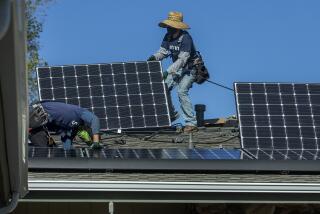Air regulators clamp down on lead emissions from battery recycling plants
Southern California air pollution officials have moved to clamp down on toxic emissions from two battery recycling plants in Los Angeles County.
The regulations, announced this week, are designed to meet the first new federal standards for airborne lead pollution in three decades, which were adopted in 2008.
But Shankar B. Prasad, a physician with the Sacramento-based Coalition for Clean Air, said the South Coast Air Quality Management District “missed a great opportunity to enforce a more health-protective limit on lead emissions, even when the technology is readily available.”
Few poisons are as damaging to the brain as airborne lead particles. Lead attacks the nervous and reproductive systems, causes cognitive and behavioral changes and increases the risk of cancer. Children are especially vulnerable, and as lead accumulates in their bodies, it can cause learning disabilities and affect IQ, memory and behavior, according to the AQMD.
The AQMD rule requires the region’s two lead-acid battery recyclers, Exide Technologies in Vernon and Quemetco Inc. in the City of Industry, to meet the U.S. Environmental Protection Agency’s new outdoor air quality standard of 0.15 micrograms of lead per cubic meter beginning in January 2012.
In letters to AQMD officials this fall, Quemetco’s Michael R. Buckantz advocated for a stricter local standard and stepped-up monitoring, saying that his company had already spent $18 million to install state-of-the-art emission controls.
Exide, which has long been the target of environmental activists in the adjacent City of Commerce, has not made a similar investment and contended that the equipment installed at Quemetco would not function at its facility.
Plant manager Corey Vodvarka wrote AQMD officials that using the new technology would “threaten the economic viability of the Exide Vernon, CA. recycling facility and Exide would have to consider the alternative of expanding operations at its other recycling facilities outside of California.”







